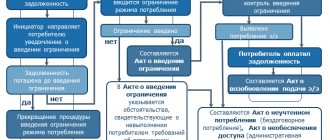Electricity in the 21st century is an attribute of a comfortable human life. Electricity powers household appliances, gadgets, and equipment, so its absence for a person becomes a phenomenon equivalent to a disaster. You have to pay for the use of these benefits, because otherwise there is a risk of being disconnected from the power grid, and therefore from civilization.
For a week of non-payment, the network organization will not take such drastic measures, but if you neglect the obligation to pay for a long time, then shutdown cannot be avoided. There is a core of legal acts that regulate the housing and communal services sector. The main requirement for implementing organizations (suppliers) is high-quality and uninterrupted supply of energy. In turn, apartment owners (consumers of the service) must pay for the supplied electricity on time and in full.
Resource supply organizations cannot refuse to provide electricity without compelling reasons, but for debts they have every right to limit and even suspend the supply of electricity to the debtor.
At what amount of debt is the supply of electricity limited?
General issues of energy supply under an energy supply agreement are regulated by the Civil Code of the Russian Federation. This regulatory act says that it is possible to limit or completely stop the supply of energy for non-payment, but only with prior warning and in relation to subscribers - legal entities (Part 2 of Article 546 of the Civil Code). It turns out that the resource supply organization (RO) cannot influence defaulting citizens in such a radical way.
However, in the field of electricity supply there are special by-laws approved by the Government: Resolution No. 354 and Resolution No. 442.
They directly regulate the ability of the contractor to provide services for the supply of electricity (this can be not only the RO, but also the management company (MC) of the apartment building, which is an intermediary between the residents of the building and the RO). These documents contain information about in which cases a restriction or complete cessation of electricity supply is applied when an individual is in arrears in payment.
Resolution No. 354 does not say what specific amount of debt will entail a consumer's power outage. The concept of “incomplete payment of utility services” appears there.
Incomplete payment of utility services - a debt to pay for electricity for a period exceeding 2 months. Moreover, the amount of payment for electricity per month in this case is calculated according to electricity consumption standards, which are established separately for each region of Russia annually.
The presence of metering devices does not affect the procedure for calculating the amount of debt. Let's try to calculate at what amount of debt the executor can limit or stop supplying an apartment with electricity in Moscow in 2021 for a family of three. The calculation shows data without taking into account the accrual of penalties.
To calculate this amount you need:
Number of residents in the apartment x Regional standard for electricity consumption x Tariff for 1 kW/h (also set by the region) x 2 (months in which they did not pay).
The consumption standard per person in a house with an electric stove in Moscow is 80 kW (50 kW if there is a gas stove). The tariff for 1 kW/h is 3.89 rubles. Amount of debt for Moscow = 3 x 80 kW x 3.89 x 2 = 1867.2 rubles.
The consumption standard is usually set by the regional executive body (Government), and tariffs can be easily found on the official website of your city's Energosbyt.
In practice, resource providers are more loyal and try for a long time and patiently to “reason” with the consumer to pay the debt and start paying regularly. This can last for years. A willful defaulter will use electricity for free, despite the fact that the amount of his debt can reach five figures and even six figures.
Partnership and direct settlements with energy sales
If the subscriber pays for energy supply services directly to the supplying organization, without the mediation of the HOA, the latter cannot interfere with the payment procedure or take any measures in relation to the recipient of the services.
In this case, there are direct relations between citizens and the energy supply organization, regulated by Part 1. Article 540 of the Civil Code. If the supply of other utilities is carried out by the HOA, then even if there are significant debts for other types of services, the organization does not have the right to limit the energy supply to the consumer as a deterrent measure.
However, the law provides for cases in which the HOA has the right to disconnect subscribers from the power supply without written warnings:
- in the event of emergency situations on communication networks or the threat of their occurrence;
- in conditions of emergency or natural disaster.
What precedes a shutdown?
Restricting or suspending the supply of energy is the right of the performer . The supplier is not required to agree on the suspension (limitation) of power supply with the consumer. However, he must first warn the consumer of his intentions by sending a written request-notification to repay the debt within 20 days, which is handed to the debtor against signature or sent by registered mail with acknowledgment of delivery.
You can also notify by writing a “message” in the payment document, by phone, on the Internet, or through the housing and communal services portal.
The main requirement for a warning is the ability to prove that the debtor received the notice within a certain period of time.
Read about whether they have the right to turn off electricity for non-payment without a court decision, read here about the procedure for turning off electricity for non-payment and how to find a way out in case of financial difficulties, read here, and how to turn off electricity in SNT, find out in this material.
After what time does the light supply become limited?
When 20 days have passed from the date of notification to the debtor, the contractor has the right to limit the supply of electricity. However, if this is not technically possible, the electricity can be turned off immediately.
Limitation of power supply must be individual . This means that other consumers, for example those living in the neighborhood, should not suffer due to violations of the debtor’s payment obligations.
Accrual of penalties
Failure to pay an electricity bill on time will not go unpunished for the debtor. Article 26 of the Federal Law “On Electric Power Industry” establishes financial liability for debtors in the form of penalties:
- accrued from the first day of delay;
- size – tied to the Central Bank refinancing rate valid on the day of actual payment of the debt;
- accrued until the day the debt is paid.
For citizens who live in municipal residential premises under social tenancy agreements, a different sanction is provided for non-payment of utilities. They are subject to eviction from the apartment by court order, with the provision of housing of a smaller area (according to the hostel standard - 6 m2 per person).
How can you achieve maximum savings in energy consumption?
So, the surest way to minimize energy costs and not in any way conflict with the law is to use it economically and wisely. This will be discussed below.
All home appliances that use electrical energy can be divided into several separate groups - each of them has its own saving approaches. Let's start with the most obvious thing - lighting.
How to save on home lighting.
Lighting usually accounts for at least 30÷35% of total energy consumption. But there is significant savings potential that should never be neglected.
- First of all, lighting should only work when it is really necessary. You can often catch a picture of lamps burning in a room on a clear sunny day. For what? Perhaps they simply forgot to turn off the light after morning twilight. And sometimes you are too lazy to get up and walk to the switch. The result is completely unjustified expenses, literally out of nowhere. A little more attentiveness and organization - and this is the result.
And in the daytime, you need to try to make the most of the “free” sunlight. This is facilitated by large windows (cleanly washed, by the way), promptly drawn curtains, and the absence of tall houseplants piling up on the windowsills.
It is interesting that even the normalization of the family’s daily routine, that is, its maximum connection to the daylight hours (timely going to bed and waking up in the morning, avoiding long “night vigils,” etc.) gives a considerable saving effect.
- Secondly, lighting should not be excessive. No, this is not a call to sit in the dark, on the contrary. There are carefully calculated and scientifically based lighting standards for different rooms. And both the insufficiency of this illumination and its excess negatively affect a person’s well-being and even health.
It makes sense to take a closer look at this issue, carry out calculations in order to create a truly effective and, at the same time, intelligently thought-out indoor lighting system in your house or apartment. Our portal can provide all possible assistance with this.
How to correctly approach the problems of choosing and arranging lighting fixtures?
Planning a lighting system should not be carried out solely for reasons of “I like it this way” or “it will do.” There are certain lighting standards that, simply for the sake of preserving the health of your family and friends, should be adhered to. For all the details and the algorithm for carrying out the necessary calculations, read the special publication on our portal “Types of lamps and calculation of room illumination .
By the way, in this recommended article it is quite clear that the degree of illumination of the premises is greatly influenced by the decoration of the walls and ceiling. It makes sense to think about this too - sometimes it makes more sense to abandon some “newfangled” delights with a predominance of dark shades in favor of light interiors flooded with natural light.
- This already looks like a “truth,” but some people don’t get it. It's time to completely abandon incandescent lamps with their monstrously high energy consumption and low efficiency. That is, they should be completely replaced with LED devices. Yes, even five years ago the excuse that it was too expensive in terms of initial investment worked. Today the situation has changed dramatically - LED lamps have become quite affordable, and their purchase pays off literally in a matter of months. And even earlier!
And taking into account the fact that a high-quality LED lamp will last much longer, there shouldn’t be two opinions about the need to switch to LED lighting.
We are not talking about “energy-saving” compact fluorescent lamps here for the reason that they are still significantly inferior to LED lamps, while maintaining approximate cost parity. Such lamps were very relevant not so long ago, playing, in fact, the role of a kind of “transition link” to more economical light sources. But, I think, their heyday is still behind us.
- Proper placement of lighting fixtures also gives tangible results. Even a multi-arm chandelier turned on at full power may not provide the same quality of illumination for a specific area of the room as a well-placed spotlight with minimal consumption. It is necessary to practice energy-saving local lighting more widely in situations where general room lighting is not required.
- A well-thought-out lighting control system can provide significant savings. What is meant?
— In those areas where only temporary illumination of the path of movement is required in conditions of limited visibility (for example, the entrance to a house, a flight of stairs, a corridor, etc.), it makes sense to install motion sensors. The light will only come on when required. The combination of this sensor with a photo relay will activate this system only after dark.
— Often in long corridors or in halls with doors to several rooms, the light is on all day long simply because you don’t want to go back to turn it off. The problem can be easily solved by installing so-called pass-through switches at all inputs and outputs. Any of them is equally capable of turning the light on and off.
Which switch and where should I put it? How to do it yourself?
The lighting control system must ensure safety, efficiency, and economical operation. Therefore, there are specific requirements for the placement and connection of switches . Read about this in a special publication on our portal.
— The installation of remote lighting control systems and the use of dimmers to adjust the brightness of lamps are encouraged.
- If night illumination of the yard or paths on the site is required, then a good solution would be to use special autonomous lamps that accumulate energy during the day due to built-in solar photocells.
So, you can already save a considerable amount on lighting alone. But this is still only the “tip of the iceberg”, since the “lion’s share” of electricity consumption still falls on numerous household appliances, without which it is difficult to imagine the life of a modern person.
Energy saving options in the kitchen
Let's start, perhaps, with the kitchen, since traditionally this is where the “maximum concentration” of various useful (and not so useful) household appliances is observed. And the kitchen takes up a lot of energy especially if it is equipped with an electric stove.
- Let's stop right away on the electric stove. If it so happens that this is the only method of cooking, then you should adhere to a number of important recommendations.
— First of all, the stove itself must be absolutely in good working order. The failure of at least one heating element sharply increases the energy consumption. Naturally, the burners themselves must be kept clean - and this is not a small thing.
— A kitchen stove is in no way a heating device, and using it in this “role” is unforgivable stupidity. And comfort cannot be achieved, and energy consumption will be “cosmic”.
— It is recommended to turn on electric burners at full power only until the liquid boils. Subsequently, the cooking process usually requires a less energy-consuming mode. And experienced owners probably also know that many dishes, upon reaching a certain stage, can be brought to full readiness even with the heating turned off completely - the residual heat is enough.
— Covered pots and pans (unless otherwise required by the cooking technology itself) significantly reduce consumption. Otherwise, large quantities of heat (and therefore the electricity spent on its generation) are simply thrown out into the hood.
— The bottom of the cookware placed on the burner must be at least as large as the burner itself. Otherwise, this also results in unnecessary heating of the air. For the same reason, it is recommended to use only dishes with a flat bottom for such a stove, which will ensure a tight fit to the burner and, therefore, maximum heat transfer.
— When cooking, for example, vegetables, you should strive to use a minimum amount of water.
— High efficiency indicators are shown by induction electric stoves. Here the principle of direct heating of cookware made from special alloys and placed in an electromagnetic field of a certain strength is implemented. Yes, such hobs are not cheap, and they require special cookware. But the energy saving effect is very impressive.
- Let's move on to the refrigerator. This device, essential for any family, is constantly connected to the network, regardless of the time of year or time of day. Of course, it does not operate continuously, and the frequency and duration of turning on the compressor depends on the operating conditions created for it.
— Of course, if you are choosing a new refrigerator, you should immediately give preference to models with energy consumption class A and higher (A+, A++, etc.). Such equipment is more expensive, but this is completely justified.
But no matter which model is used, there are some important rules to follow to maximize energy savings.
— The refrigerator must be in full working order. Moreover, this means not only its electrical and, in fact, refrigeration parts, but also the condition of the doors with seals. Loosely fitting doors are always a very sensitive waste of energy.
— The cost-effectiveness of operating this device largely depends on the correct installation. Normal heat exchange must be ensured, and for this purpose certain gaps are maintained between the refrigerator, pieces of kitchen furniture, and walls. These parameters are always specified in the operating instructions for the unit. Failure to comply can result not only in increased energy consumption, but also in complete failure of the device.
— For the same reason, the refrigerator should not be located near the stove or heating appliances; it should not be exposed to direct sunlight from the windows.
— You shouldn’t fill the refrigerator to capacity with food. Free circulation of cold flows in its chambers must always be ensured. Particular attention is paid to the cleanliness and openness of the back wall. So try to place products on the shelves so that at least a quarter of the space remains free.
— And, of course, the refrigerator must be kept clean. All preventative maintenance recommended by manufacturers must be carried out. If the unit requires periodic defrosting, then you should not wait until the entire freezer compartment is tightly packed with ice and snow. It cannot be brought to such a state at all.
- An electric kettle is a very convenient device that allows you to quickly boil the required amount of water. And the key word here is “the right amount.” What's the point of filling a full kettle if your plan is to brew only two cups of tea or coffee? But this happens at every step! Unused boiling water cools down for nothing, and then the whole story repeats itself with the same incomprehensible stubbornness. What kind of savings can we even talk about here?
Do not forget, in addition, that the kettle must be periodically descaled. A layer of limescale dramatically reduces heat transfer from the heating element to water. This also entails an increase in energy consumption.
- Microwave oven - many have already become accustomed to this kitchen appliance and cannot do without it. But savings are also possible here, for example, using special containers with tight-fitting lids for cooking or heating food. This allows you to achieve the expected result faster and, as a result, reduces energy costs.
- A dishwasher - many people see it as simply overkill, and we can generally agree with this opinion. But since it has already become part of your everyday life, and you don’t want to give it up, then at least you shouldn’t “drive” it because of two or three plates, which are easier and faster to wash by hand.
- Many kitchens have a whole arsenal of other appliances - these are multicookers, bread machines, ovens, food processors, meat grinders, toasters and other equipment. It's difficult to give advice here. It’s just that if the issue of saving energy is very urgent, perhaps some amenities are worth sacrificing for a while - there will certainly be an opportunity to replace them with “manual labor”. If not, then all that remains is to pay for the kilowatts consumed, simply by exercising due prudence when using such equipment.
Heating, air conditioning, water heating
- We will not consider the situation when exclusively electrical appliances are used as a heat source - this is a completely separate case. But the use of electric heaters as an additional source of heat during the cold off-season often becomes one of the most costly components.
What are the recommendations here?
— First of all, not all heaters are equally economical. The correct choice of device is one of the most important conditions. For example, expecting miracles from a massive oil cooler is hardly reasonable. But a high-quality convector or heat fan will be able to warm up the room faster and at a lower cost.
There are many criteria for evaluating heating devices when purchasing them. But this is a separate topic for detailed consideration.
Electric heater – which one to choose?
These devices are divided into several groups, differing in the very principle of their design and operation. To learn about the advantages and disadvantages of each type, and to understand the criteria for correctly evaluating the purchased model, read the article on our portal “Energy-saving electric heaters for the home .
- Any, even the most economical heating device will literally “devour” electricity if the house or apartment does not have high-quality thermal insulation, if the windows and doors are not in order.
— You should be reasonable in your desires - it’s hardly worth trying to create “African heat” in your rooms, especially at the expense of expensive electricity. That is, the thermostat of heating devices (and it must be present) is adjusted to the minimum required temperature. Which, by the way, can be significantly reduced during the period when the home is empty (everyone is at work or school) and at night (a good blanket is quite enough, and in a cool atmosphere, sleep is much better). Purchasing a thermostat with the ability to program operating modes will solve this problem.
- The above largely applies to air conditioning systems. Likewise, without high-quality thermal insulation of housing, maintaining an optimal microclimate will be very wasteful. And during the summer heat, you should not strive for too low temperatures - it won’t take long to get a serious cold, even if you do not take into account energy consumption. Usually a threshold of 24÷25 degrees is perceived quite comfortably.
In addition, the air conditioner must be serviced with enviable regularity - the filters must not be allowed to become clogged with dust, so that the drainage tube becomes clogged with dirt. All this will lead to a sharp increase in energy consumption.
- If an exhaust fan is installed in the bathroom or bathroom, then it is better to use devices with a timer - a shutdown delay after the lights are turned off. This will make it possible to fully clean the air, but the rest of the time the fan will “rest” without wasting electricity.
- Electric instantaneous water heaters have repeatedly proven their unprofitability. It is much more profitable to use devices of the accumulative principle - boilers. There is always a supply of hot water at your disposal, and the high-quality thermal insulation of the boiler prevents it from cooling down quickly.
It would be even more reasonable, if you have a capacious boiler, to operate it at night if there are differentiated electricity tariffs in the locality. All this will give a very sensitive saving effect.
But to prevent the boiler from becoming a “waste of resources” and consuming more than it should, it must be periodically serviced. In particular, check the condition of the anode rod, which collects scale, and the heating elements. If necessary, replace.
Other household appliances
A few more recommendations for some household appliances where you can also save energy.
- Today, few people can live without a washing machine. But to ensure that its use does not turn into excessive consumption of electricity, certain rules must be followed. In particular, you must adhere to the recommended drum loading volume. Exceeding this leads to an increase in the load on the drive with all the understandable consequences. Washing in very small batches is a completely wasteful activity.
If possible, you should choose washing modes with minimal time and at the minimum temperature acceptable for this type of laundry. Of course, so that quality is not lost. But housewives probably know much more about this. In addition, many models have a maximum economical washing mode preset by the manufacturer.
- A reliable assistant in putting things in order, a vacuum cleaner will not become a “waste of energy” if you empty the garbage container in time or shake out (replace with a new) dust collection bag. In addition, the condition of the device’s air filters should not be overlooked.
By the way, general cleanliness and order in the premises of an apartment or house always have a positive effect on overall energy consumption. The explanation is simple - clean windows open to light, dust-free lamps and lamp shades, unclogged filters on household appliances, etc.
- In fact, it is recommended that all household appliances be unplugged when not in use. But today, many types of home appliances are equipped with power supplies with a standby mode - waiting for a command from the remote control. Consumption here is minimal, and it is unlikely that complete disconnection from the network will bring any noticeable savings effect. And such constant de-energization does not benefit the electronics.
But there is another pitfall. A very common occurrence is that the set-top box (satellite, digital cable or IP, it doesn’t matter) turns off, the TV screen goes off, the sound goes silent - and the owners calmly go to bed. Meanwhile, the television receiver itself remains turned on, although this does not appear visually. You should be more careful with this.
With computers it’s a different story. Many users fundamentally do not want to disable them. This means that it makes sense to properly configure power management to ensure minimal power consumption during idle times.
Chargers for numerous gadgets of all family members can hardly be considered as too expensive devices in terms of energy consumption. But still, leaving them constantly on is also not worth it. Even if not for reasons of economy, the no-load position does not benefit them.
* * * * * * *
They may ask: what about the widely advertised devices that allow the use of so-called “negative energy” and provide savings of almost 50%?
You can answer with the famous quote from the great Russian director K. Stanislavsky - “I don’t believe it!” To tell the truth, for me personally this technique is located approximately on the same level as “the miraculous Herbalife”, with the “magical possibilities of green coffee”, with “miracle knives” and “exercise machines that guarantee iron abs in three days”.
There are several reasons for this mistrust:
- Firstly, the advertising is too intrusive, typical specifically for such products, designed for “miracle lovers”.
- Secondly, there is already quite enough information (test samples) on the Internet on this matter. Why repeat other people's mistakes?
- And thirdly, if such devices really made it possible to pay significantly less, that is, to the detriment of energy suppliers, then they would have long ago been strictly prohibited at the legislative level. And since experts treat them like some kind of children’s toys, then this already explains everything.
In short, under the guise of a miracle cure, the gullible consumer is sold a plastic box with a power supply for several joyfully blinking LEDs. Well, at least there is no particular harm, just money thrown away in the literal sense of the word.
Believe me, even without any miracles you can achieve quite economical energy consumption. By following at least some of the recommendations suggested above, you can feel a tangible effect.
Terms of turning off the lights from the moment of notification
After how long the lights in the apartment will be turned off depends on whether it is technically possible to limit the debtor’s power supply or not.
- If this is not possible, then the lights are turned off 20 days from the date of notification of debt repayment.
- If it is permissible to limit the supply of energy, then the lights can be turned off after 10 days from the date of limitation of supply, and, accordingly, 30 days from the date of notification to the debtor.
In a situation where a utility service is completely suspended, a representative of the RO or management company comes and seals the equipment that provides the debtor with electricity.
All expenses associated with disconnection/suspension/resumption of power supply are reimbursed by the debtor.
At the time of disconnection of the debtor, a power outage act is drawn up. It is impossible to turn off (suspend) the supply of energy to a consumer-debtor if this entails:
- interruptions in supply to other consumers;
- damage the property of the owners of the apartment building;
- will violate the requirement for the apartment to be suitable as a residential premises.
Where to go to renew the contract?
If employees from the State Budgetary Institution came to the owner and turned off the electricity for a debt on housing and communal services, he must contact the management company to restore electricity. The organization's address and telephone number are indicated in the payment receipt or notice (act) of service suspension.
In cases where electricity was illegally turned off, for example, for debt on utility bills other than electricity, the payer can file a complaint with the court. After considering the case, the court makes a decision on the existence of grounds for turning off electricity in the apartment for non-payment of utilities.
Only a judge can determine whether the management company has the right to limit the owner in the provision of electricity.
Will the debt be written off due to the statute of limitations?
The law says that debts can be written off if the statute of limitations for utilities has passed. But it's not that simple.
The statute of limitations is the period during which someone whose rights have been violated can go to court for protection. And this period is 3 years according to the Civil Code of Art. 196.
The management company can “store” your debts for more than 3 years and demand payment from you at any time. However, if you indicate in your petition that the statute of limitations has passed, your debts will be written off. Without this document, the management company will have the right to demand the debt in full and the court will not take this into account.
It is also worth considering that for each receipt there is a separate period depending on the date, and not all the debts that you have. If the debtor nevertheless acknowledges the debt, the statute of limitations will be renewed or interrupted. Even if he paid part of the debt, at least one hundred rubles, this will be a fact of recognition.
Who can avoid paying for utilities?
In 2021, the state provides certain segments of the population with the opportunity to pay less for housing and communal services. Beneficiaries include:
- WWII participants;
- disabled people of groups 1 and 2, including families with a disabled child;
- heroes of labor;
- combat veterans;
- liquidators of accidents at the Chernobyl nuclear power plant;
- large families.
The discount on payment for housing and communal services is provided in a fixed amount. In 90% of regions, beneficiaries are completely exempt from paying for gas and partially, in the amount of 50%, for electricity .










